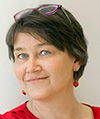Elina Vuola
TT, dosentti, akatemiaprofessori, DrTh, Docent, Academy Professor

Jewish women in Finland
The Jewish community in Finland is small: about 1500 of which 1200 in Helsinki. There are two Jewish communities in the country with their own synagogues, both Orthodox, with a rabbi in Helsinki. Today, because of immigration, the Jewish community is a multicultural and international community, where several languages are spoken and people come from different (Jewish) backgrounds. At the same time, the community is well integrated into Finnish society.
Since the Jewish communities in Finland are Orthodox, women are excluded from ritual leadership roles, men and women sit separately in the synagogue, women are not called to read the Torah, and are not counted in the minyan (the quorum of ten adult males that is necessary for a service). Finnish Jewish women are highly educated, support gender equality in the secular sphere, and are respected members of the community. The segregating Orthodox practices are mainly limited to the synagogue.
I will interview Finnish Jewish women in 2015-16 with PhD Dora Pataricza. The interviews will focus on how Jewish women construct their identities in relation to the Jewish community and tradition, the family and the larger Finnish society.
Juutalaiset naiset Suomessa
Suomen juutalaisyhteisö on pieni: noin 1500, joista noin 1200 Helsingissä. Maassa on kaksi ortodoksijuutalaista seurakuntaa, mutta vain Helsingin juutalaisella seurakunnalla on oma rabbi. Nykyään juutalaisyhteisö on maahanmuuton vuoksi monikulttuurinen ja kansainvälinen. Yhteisö on hyvin integroitunut suomalaiseen yhteiskuntaan.
Koska Suomen juutalaiset seurakunnat ovat ortodoksisia, naisilla ja miehillä on erilaiset roolit ja tehtävät varsinkin synagogassa.
Haastattelen 2015-16 juutalaisia naisia yhdessä PhD Dora Patariczan kanssa. Haastatteluissa pyritään tavoittamaan se eletty kokemus, jossa naiset neuvottelevat suomalaisuuden ja suomalaisen yhteiskunnan tasa-arvoideaalien kanssa sekä tulkitsevat uskonnollista perinnettään ja identiteettiään monin tavoin. Miten Suomen juutalaiset naiset kokevat paikkansa seurakunnassa, perheessä ja yhteiskunnassa?